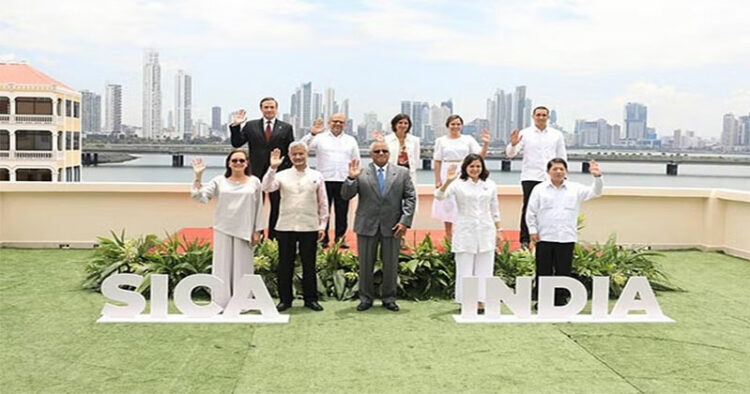External Affairs Minister S Jaishankar is on a visit to Latin America where he attended the 4th India-SICA (Central America Integration System) Ministerial meeting in Panama.
In his opening remarks, Jaishankar said India’s motto for the G20 is one earth, one family, one future.
“An India that is a digital deliverer, that is an enthusiast of startups, that is a pharmacy of the world, that is a growing manufacturing power, that is a climate leader, and that is science and technology partner,” he added.
“We admire the role played by SICA in Central American regional integration and thank you collectively and individually for the valuable support that you have extended to forging a strong relationship, as well as supporting India in various international and multilateral forums,” Jaishankar said in his opening remarks at the fourth SICA.
Jaishankar said as developing countries, SICA members share common perspectives and are confronted with common global challenges.
“I can say that we are suffering from the Covid and the Ukraine conflict, but we also have to deal with preexisting conditions, and these are climate change, poverty reduction, and food and energy security, amongst others,” Jaishankar added, highlighting various global concerns.
“It is with that (preexisting conditions) in mind that Prime Minister Modi took the initiative of holding the voice of Global South summit of 125 nations in which many of you participated. And in the words of Prime Minister Modi was that no group should claim leadership without thinking of those most affected,” Jaishankar said.
“Soliciting the views of the Global South, we dump this as essential in our responsibility as the G 20 chair,” he added.
“2023 is a very special year because of G20 presidency. But it is also a year of exceptional responsibility because we take up this responsibility at a time when East-West polarisation is very strong and North-South divides are getting deeper. The underlying theme of our presidency is Vasudaiva Kutumbakum, which means the world is a family. And again, we have sought to translate this into practical action,” Jaishankar said on world unity.
“Many of you saw for yourselves during the COVID through the Vaccine Maitri, the Vaccine Friendship Initiative, which focused on this region,” he added.
“I speak of the G20 at some length because all of us are going to be affected by what the G20 does or does not do. I bring to your attention the thinking of Prime Minister Modi, whose view is that let not the issues that we cannot resolve come in the way of those that we can,” Jaishankar said, quoting Prime Minister Narendra Modi.
“Today, we are gathered here as countries with strong bilateral ties, as a partnership between India and SICA as an expression of the common South-South cooperation to which we are all committed, but also as part of our larger commitment to building a fairer and more just international order,” Jaishankar said.
“Energy and food security are the two most immediate global challenges that the South faces. There are the longer-term trends, the priorities which will go beyond food and energy security, including those of development, growth, trade, investment, employment, poverty reduction,” the EAM said.
On the global issues taken up by India, Jaishankar said, “I would like to flag two notable initiatives we took the International Solar Alliance and the Coalition for Disaster Resilient Infrastructure. I would urge all of you to see how you can take the most advantage of it.”
Speaking of the third initiative about the declaration of the International Year of Millets, he said, “Substantial expansion of global production of millets has the potential to address food security on a lasting basis. Not just food security, but also nutritional security, because it is a good source of iron, vitamins and micronutrients.”
He stated that millets have been part of the Indian tradition for many centuries, and the world would be better served if it was revived.
“So, in conclusion, let me emphasise that today it is a new India that seeks to partner with the SICA,” he said.
“Appreciated the role of Secretary General of SICA, Werner Vargas at the India-SICA FMM. His efforts in supporting the fourth India-SICA FMM were commendable. Agreed to take this forward through a concrete Plan of Action,” Jaishankar tweeted.
On the sidelines of the SICA, EAM Jaishankar also met his counterparts and various ministers from Central American nations.
He met Vice Minister Cindy Rodriguez of Honduras on Tuesday on the sidelines of the SICA ministerial. The two leaders agreed that the India-SICA partnership offers many possibilities.
Jaishankar also met Guatemala Vice Minister Roberto Urzua at India-SICA Ministerial.
He also met FM Eamon Courtenay of Belize on the sidelines of SICA.
The Foreign minister also exchanged words with his Nicaraguan counterpart Denis Moncada on the India-SICA FMM sidelines.
Jaishankr also met the Foreign minister of El Salvador FM Alexandra Hill Tinoco.
The Central American Integration System (SICA) was set up in 1991 as the revived institutional framework for Regional Integration in Central America.
SICA evolved from the original Organisation of Central American States (ODECA) initially begun in 1951 and Central American Common Market set up in 1960.
SICA consists of seven full members: Belize, Costa Rica, El Salvador, Guatemala, Honduras, Nicaragua and Panama; and Dominican Republic as the Associate Member (Total 8).
The 14 observers in SICA include: US, Chile, Mexico, Brazil, Argentina, Peru (as regional Observers) and Spain, France, Italy, Germany, Japan, South Korea, Taiwan and Australia (as non-regional Observers).
US joined SICA as Observer in 2012 and France and South Korea’s Observer status has been approved by SICA’s apex decision-making Body and formal agreements are soon to be signed. SICA Secretariat is based in San Salvador.




















Comments